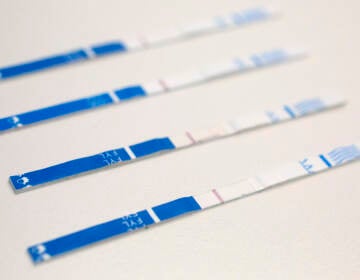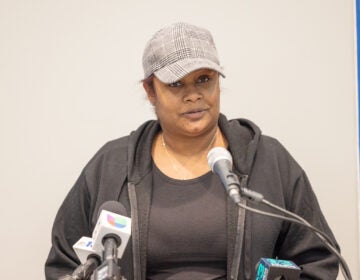Study: Philadelphians with opioid use disorder remained on treatment longer during pandemic
Drexel University researchers call for reduced prescribing restrictions to persist after study finds people with opioid use disorder more likely to stay on their treatment.

File photo: Prevention Point at the intersection of Kensington Avenue and Monmouth Street. (Kimberly Paynter/WHYY)
Philadelphians with opioid use disorder were better able to stay on medication-assisted treatment after prescribing restrictions were loosened during the COVID-19 pandemic. That’s according to a Drexel University study that compared treatment retention before and after the pandemic.
Buprenorphine reduces opioid cravings and withdrawal symptoms — helping people to stop using opioids, and reducing the risk of fatal overdose. So, health experts say expanding access is critical.
“There is a link to a 50% decreased chance of overdose death,” said co-author Kathleen Ward, a doctoral research fellow at the Urban Health Collaborative at the Dornsife School of Public Health at Drexel University.
“And that can be related to a lot of different things in terms of being linked into care, where you can find access to not just medication, but also other types of social services; whether that’s housing or food access, or any other kinds of social services that can connect people and support them in their recovery, on top of also accessing medication for opioid use disorder.”
However, prior to the pandemic, patients using buprenorphine had to make in-person appointments at least once a week, and get drug tested. Drexel researchers found that those requirements deterred people from sustaining their treatment regimens.
They evaluated medical records and the Pennsylvania Prescription Drug Monitoring Program for 506 patients who received buprenorphine at the harm reduction organization Prevention Point Philadelphia between September 2018 and June 2020.
During that mainly pre-COVID time period, only about one in five patients continued their treatment for at least 180 days, according to Drexel researchers. Patients are recommended to take buprenorphine for a minimum of 180 days for the treatment to be effective. However, the average retention period prior to the pandemic was 22 days, according to the Drexel study.
“Even before you got to the clinic, you sometimes had to take two buses, three buses, a bus and two trolleys. And, clinics have a set number of hours, a set number of patients that they can see in a day,” said co-author Dr. Ben Cocchiaro, who is also a clinician at Prevention Point. “If your bus was late, if the trolley broke down, if your kid had a sickness and had to be picked up from school and you couldn’t make it to the clinic, we couldn’t prescribe for you.”
After the Drug Enforcement Agency loosened restrictions and permitted telehealth appointments for buprenorphine prescriptions, the percentage of patients who continued treatment for at least 180 days tripled, the Drexel study found.
“When you subject people to a regime of surveillance and mandatory attendance and a dozen other additional program requirements, they rightfully believe that they are in a prison and not in a clinic,” said Cocchiaro, who is also a professor of family medicine at Drexel University College of Medicine and Penn State Hershey College of Medicine. “When you relax restrictions, they come to your clinic more, not less. They stay with the program more, not less. They recover better, not worse.”
He said telehealth appointments do not reduce the quality of healthcare the patient receives, emphasizing that patients can still receive wraparound services, including counseling.
The study’s authors say the study makes a case that the regulatory changes should persist, and that federal agencies should reevaluate the way they approach drug use disorder.
“Our goal is to really liberalize this access to [Medication-Assisted Treatment], so more people can get the medication that can help people stay in treatment for opioid use disorders and can also reduce the risk of overdose death if they are taking the medication,” Ward said.
“These policies are emergency use only, essentially … So there’s no guarantee that these are going to exist in the post-pandemic era. So it’s on us as researchers to really advocate for the lessened restrictions to stay in place.”

Get daily updates from WHYY News!
WHYY is your source for fact-based, in-depth journalism and information. As a nonprofit organization, we rely on financial support from readers like you. Please give today.







